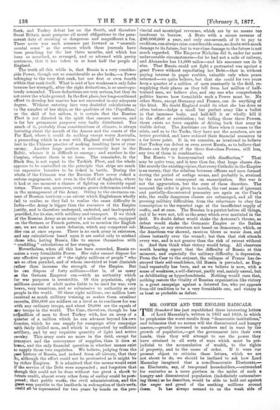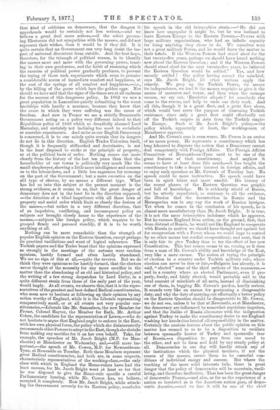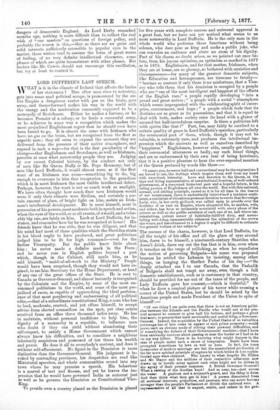KR. 00WEN AND THE ENGLISH RADICALS.
THE Standard has just republished three interesting letters
of Lord Macaulay's, written in 1857 and 1859, in which he prophesies the worst results from "democratic institutions," and intimates that no sooner will the discontented and hungry masses,—greatly increased in numbers and in want by the growth of population,—get the government into their own • hands, than they will attempt to use the power they have attained in all sorts of ways which must be pre- judicial to the accumulation of wealth, to the rights of property, and to the cause of order. If it were our present object to criticise these letters, which we are not about to do, we should be inclined to ask how Lord Macaulay imagined that a non-Democratic Electorate,
an Electorate, say, of ten-pound householders,—entrenched for centuries as a mere garrison in the midst of such a hungry and discontented population (indefinitely outnumber- ing them) as he describes, would be able to hold out against the anger and greed of the seething millions around them. It has always seemed to us the weak side of that kind of criticism on democracy, that the dangers it apprehends would be certainly not less serious,—and we believe a great deal more serious,—if the select govern- ing Electorate did not sympathise with the masses, and did not represent their wishes, than it would be if they did. It is quite certain that no Government can very long resist the im- pact of universal discontent from outside. And the best hope, therefore, for the triumph of political reason, is to identify the masses more and more with the governing power, trust- ing to their own good-sense, and the habit of reasoning which the exercise of political power gradually produces, to prevent the trying of those rash experiments which seem to promise a considerable access of immediate comfort and happiness, at the cost of the springs of all comfort and happiness,—i.e., by the killing of the goose which lays the golden eggs. Nor should we have said that the signs of the times are at all ominous for the success of this dangerous policy. In 1862 we saw a great population in Lancashire quietly submitting to the worst hardships with hardly a murmur, because they knew that the cause in which they were suffering was the cause of freedom. And now in France we see a strictly Democratic Government acting on a policy very different indeed to that Republican policy of 1849 which so dreadfully alarmed Lord Macaulay, and certainly not inclining too much to socialistic or anarchic experiments. And as far as our English Democracy is concerned, it is to our minds quite certain that its dangers do not lie in this direction. English Trades Unionism itself, though it is frequently stiffnecked and doctrinaire, is not in the least disposed to strike at the principle of property, or at the political basis of order. Nothing comes out more clearly from the history of the last ten years than that the householder of our towns is politically very much like the small shopkeeper, showing a little more intelligence and concern as to the labour-laws, and a little less eagerness for economy on the part of the Government ; but a mere variation on the old type of elector, by no means a different type. What has led us into this subject at the present moment is the strong evidence, as it seems to us, that the great danger of democracy does not in the least lie in the direction supposed, —the direction of a blind impatience with all those laws of property and social order which limit so closely the desires of the masses,—but rathei in a very different direction, that of an impulsive, vacillating, and inconsequent policy on subjects not brought closely home to the experience of the masses,—subjects like foreign policy, which requires to be grasped firmly and pursued steadily, if it is to be worth anything at all.
Nothing can be more remarkable than the strength of popular English opinion on the Eastern Question, except perhaps its practical vacillations and want of logical coherence. The Turkish papers and the Tories boast that the opinions expressed so strongly in the meetings of the autumn were random opinions, hastily formed and often hastily abandoned. We see no sign of this at all,—quite the reverse. But we do think they were opinions so far hastily formed, that the electors never thought of the necessity for any more sacrifice in the matter than the abandoning of an old and historical policy, and the writing of a few strong despatches by Lord Derby, in a quite different strain from those of the early part of the year, would imply. At all events, we observe this, that it is the repre- sentatives of the greatest and best defined Radical constituencies, who seem now to hesitate at following up their opinion by any action worthy of England, while it is the Liberals representing comparatively small, or at all events not very popular con- stituencies,--Liberals like Mr. Samuelson, the new Member for Frome, Colonel Hayter, the Member for Bath, Mr. Arthur Cohen, the candidate for the representation of Lewes,—who do not hesitate to argue that England ought to enforce in the East, with her own physical force, the policy which she disinterestedly recommends other Powers to adopt in the East, though she shrinks from making any sacrifice for it on her own behalf. Take, for example, the speeches of Mr. Jacob Bright (M.P. for Man- chester) at Manchester on Wednesday, and,—still more im- portant,—the speech of Mr. Cowen, M.P. for Newcastle-on- Tyne, at Newcastle on Tuesday. Both these Members represent great Radical constituencies, and both are, in some respects, characteristic representatives of the working-class,--the only class with which in England the Home-rulers have had the least success, for Mr. Jacob Bright went at least so far that he was disposed to give the Home-rule specific a careful Parliamentary hearing, while Mr. Cowen has we believe, accepted it completely. Now Mr. Jacob Bright, while attack-' ing the Government severely for its Eastern policy, concludes his speech in the old laissez-faire strain :•••" He did not know how unpopular it might be, but he was inclined to leave Eastern Europe to the Eastern Powers,—Powers with large military organisations, who had an infinite capacity for doing anything they chose to do. We ourselves were not a great military Power, and he would leave the matter in their hands. If the Western Powers had stood aloof for the last twenty-five years, perhaps we should have heard nothing new about the Eastern Question ; and if the Western Powers should stand aloof for the next twenty-five years, he believed the Eastern Question would be settled." Yes, and how meanly settled I Our policy having caused the mischief, says Mr. Jacob Bright, let other nations apply the remedy. We prop up the Turkish Power, we secure its independence, we lend it the money requisite to give it the means of massacre and terror, and then when the carnage ensues, we cry out, 'Exoriatur aliquis 1' let somebody else come to the rescue, and help to undo our dirty work. And all this, though it is a great fleet, and a great fleet alone, which would best serve the purpose of disarming Turkish resistance, since only a great fleet could effectually cut off the Turkish empire in Asia from the Turkish empire
in Europe. Such is Mr. Jacob Bright's policy,—the policy which, apparently at least, the working-men of Manchester approve.
And Mr. Cowen's case is even worse. Mr. Cowen is an orator of no mean power. He represents a constituency which has long laboured to disprove the notion that a Democracy cannot deal competently with Foreign Affairs. The Foreign Affairs Committee of Newcastle-on-Tyne used to be one of the
great features of that constituency. And anyhow it seems to have at least done this much,—it has taught the constituency to take a deeper interest in foreign affairs, and to enjoy such speeches as Mr. Cowen's of Tuesday last. No speech could be more instructive. No speech could have been in spirit fairer and more candid. His history of the recent phases of the Eastern Question was graphic and full of knowledge. He is evidently afraid of Russia, but he utterly repudiated, as contrary to all the evidence, the illusion that the insurrection in Bosnia and the Herzegovina was in any way the work of Russian intrigue. Yet when he comes to the conclusion of his speech, he is almost more unsatisfactory than Mr. Jacob Bright. It is true, it is not the mere laissez-faire indolence which he approves. But he excuses England from action, on the ground, first, that from distrust of Russia, he would not like England to co-operate with Russia (a motive we should have thought not against but for co-operation with a Power whom we could hope to control by no other means but cordial co-operation) ; and next, that it is only fair to give Turkey time to try the effect of her new Constitution. This last reason seems to us, coming as it does from a man of Mr. Cowen's ability and knowledge of the East, very like a mere excuse. The notion of trying the principle of election in a country under Turkish military rule, where election can never be free or fair,—Bulgaria has already, it is said, " elected " some of the chief authors of the massacres,— and in a country where an elected Parliament, even if pro- perly, freely, and fairly elected, would probably add to the total amount of mischiefs of all sorts, instead of diminishing one of them, is, begging Mr. Cowen's pardon, hardly serious. It sounds very like an excuse for postponing a disagreeable duty, and why the duty of carrying out effectually a better policy on the Eastern Question should be disagreeable to Mr. Cowen, we do not see, unless it be that at Newcastle, as at Manchester, the democracy are influenced by somewhat capricious impulses, and that the dislike of Russia alternates with the indignation against Turkey to make the constituency desire to see England washing her hands (too late) of all responsibility in the matter. Certainly the anxious feature about the public opinion on this matter has seemed to us to be a disposition to oscillate between spasmodic horror of Turkey and spasmodic fear of Russia,—a disposition to pass from one mood to the other, and not to form and hold by any steady policy at all. Democracies in our day will . hardly attack any of the institutions which the physical instincts, if not the reason of the masses, assure them to be essential con- ditions of individual energy and success. But where the teaching of the more solid interests fails, there is great danger that the policy of democracies will be uncertain, vacil- lating, and therefore ineffective. That has been the great danger of democratic France,—and also, as far as the experience of a nation so insulated as is the American nation goes, of demo- cratic America,—and we fear it will be one of the chief
dangers of democratic England. As Lord Derby remarked months ago, nothing is more difficult than to collect the real wish of "our masters" on questions of foreign policy, and probably the reason is this,—that as there are no great and solid interests sufficiently ostensible to popular eyes in the matter, these wishes tend to assume the form of great waves of feeling, of no very definite intellectual character, some phases of which are quite inconsistent with other phases. But leaders like Mr. Cowen should not encourage this vacillation, but try at least to control it.








































 Previous page
Previous page